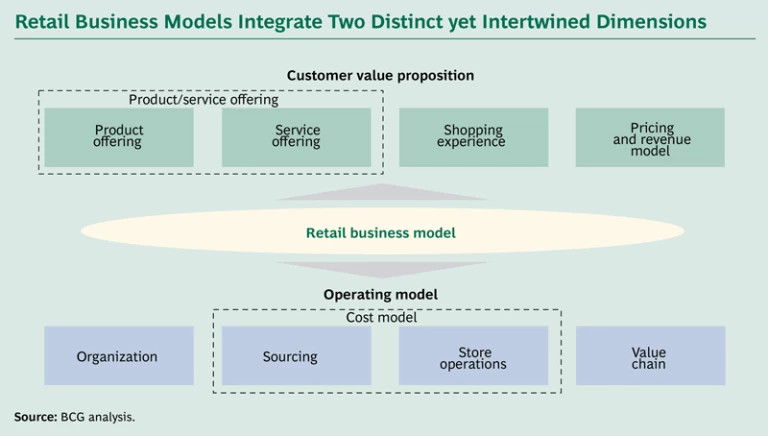Some retailers assume that a little tinkering with the value proposition is all it takes to adapt to changes in the marketplace. Although it is almost always necessary to keep the value proposition aligned with shifts in the market, the most successful retailers make significant improvements in their operating model as well, because the value proposition and operating model together are responsible for the entire business model’s success. (See the exhibit.)
The value proposition is the differentiating offer the company makes to its customers. It includes the following elements:
- The product or service, including the depth and breadth of assortment, private-label options, and product quality
- The customer’s shopping experience, including the physical layout of the store and the arrangement of merchandise
- The pricing and revenue model, including the pricing strategy (such as high-low or everyday low prices) and value-added services, such as free delivery
The operating model supports the value proposition by enabling the retailer to fulfill its pledge to its customers. It includes the cost model (sourcing and store operations), the value chain structure (degree of integration with suppliers and logistics, for example), and the organizational processes.
Most managers’ time and resources tend to be focused on changes to only one or two elements of the business model. Few companies think about changing it entirely.
We recommend that a retailer begin optimizing its business model by using deep “customer discovery” techniques to identify what its target customers like and dislike in the product and shopping experience, as well as their shopping patterns. It can then develop a value proposition that serves those target customers and an operating model that enables the company to effectively deliver it.
A business model developed in this way evolves with changes in the environment, and the value proposition continues to be aligned with the needs of consumers. The retailer should also leverage opportunities that the operating model provides to create differentiating features in its value proposition.
Consider Grand Frais, a growing French retailer specializing in ultrafresh fruits, vegetables, fish, cheese, and meat. It leveraged the abilities and know-how of its owners—most of which are wholesalers specializing in specific categories, such as fish (Zeus Faber) and fruits and vegetables (Prosol Gestion)—to create a competitive offering in each category combining optimized product assortment and very attractive prices. The result was a new business model that has succeeded in capturing a growing share of the highly competitive French market.








